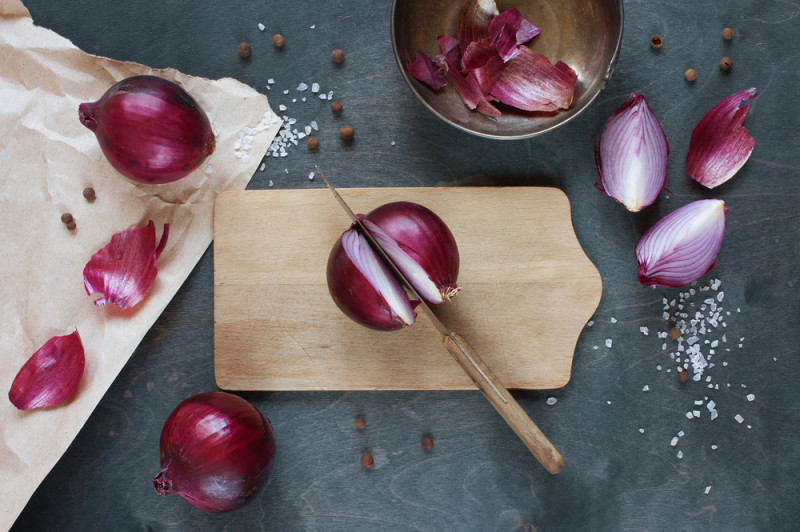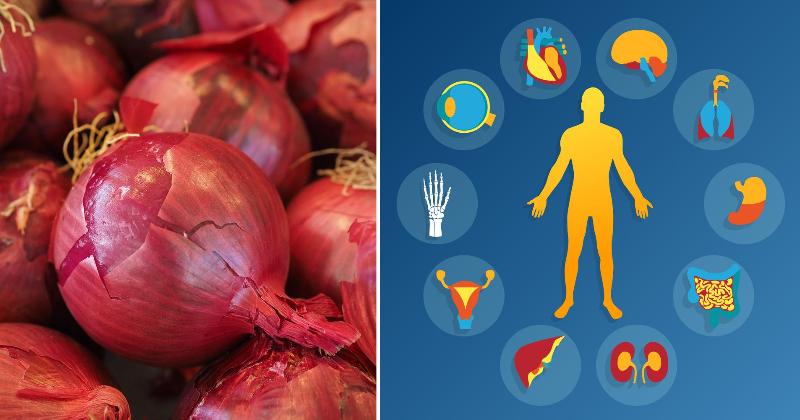While your partner might not approve of those red onions on your sandwich, they add the perfect amount of extra flavor, don’t they? If your taste buds dance at the thought of red onions, you’ll love these added reasons to keep them in your diet!
1. Allergies
Quercetin is an antioxidant that protects against damage from free radicals, and red and yellow onions are one of the best natural sources of it. In test tubes, quercetin prevents immune cells from releasing histamines, which are chemicals that can cause allergic reactions. Researchers believe that it may help reduce symptoms of allergies, including a runny nose, watery eyes, hives and swelling.
2. High Cholesterol and Hypertension
Other studies have shown that quercetin prevents damage to LDL cholesterol, and many population studies have shown that people who eat diets high in flavonoids have lower cholesterol levels. For those suffering from hypertension, studies have shown that quercetin can successfully reduce blood pressure.
3. Cancer
Quercetin and other flavonoids in fruits and vegetables are considered important in cancer prevention. Studies have suggested that flavonoids have anti-cancer properties, and people who eat more fruits and vegetables tend to have a lower risk of certain types of cancer. Quercetin and other flavonoids have been found to inhibit the growth of cancer cells from breast, colon, prostate, ovarian, endometrial and lung tumors.

4. Heart Health
Red onions provide allicin, a compound that has been shown to help lower LDL cholesterol levels while increasing HDL cholesterol levels, aiding in the prevention of heart-related health conditions such as heart attack, atherosclerosis and stroke.
5. Insulin Resistance
Onions are rich in chromium, a trace mineral that can help control glucose levels. It’s essential for insulin activity in metabolizing carbohydrates, fats and proteins, so for those who suffer from insulin resistance, onions may be especially beneficial. Not having enough chromium in the body can lead to an impaired ability to control blood-sugar levels, which may increase the risk of cardiovascular disease and type 2 diabetes.
6. Weight Loss
If you’re not familiar with the glycemic index, it ranks carbohydrates on a scale from 1-100 based on how quickly they raise blood sugar levels. With a glycemic index of 10, onions are considered to be a low glycemic food. The index was initially created to help diabetics choose which foods were best for them, but now it’s also being used to help people lose weight and improve their health. By choosing low GI foods such as red onions, you can regulate blood sugar and insulin levels, allowing the body to store less fat.
Red onions are packed with nutrients that can protect against cancer, fight fungi and bacteria, promote cardiovascular health, reduce high blood pressure and even aid in weight loss. They are readily available year- round, and can be cooked or prepared in a wide variety of ways. Here are a few onion tips and tricks:
- When buying, look for fresh red onions that are clean and unopened at the neck. Avoid ones that show sprouting or have signs of mold.
- Other signs of old onions include soft spots, moisture and dark patches.
- Store your onions in a cool, dark place, away from moisture. If you plan to keep them in a refrigerator, use them immediately upon taking them out.
- Onions can be chopped or slice and used in almost every type of food, including salads, soups, sandwiches, and homemade dips! Eat them uncooked as much as possible.
h/t: healthy food house


